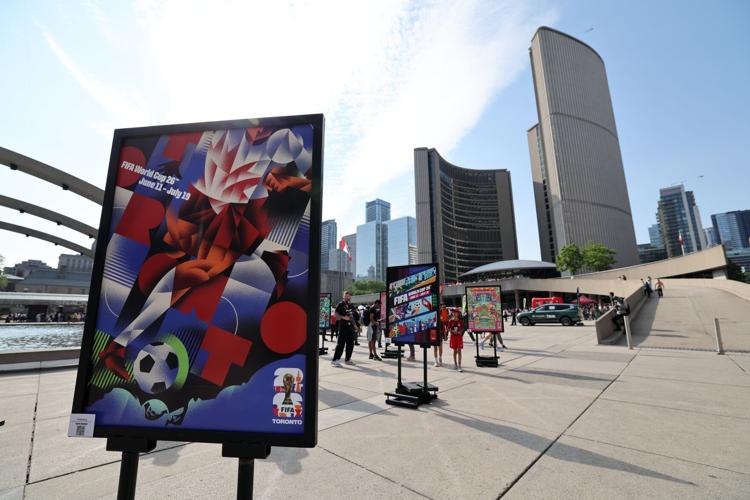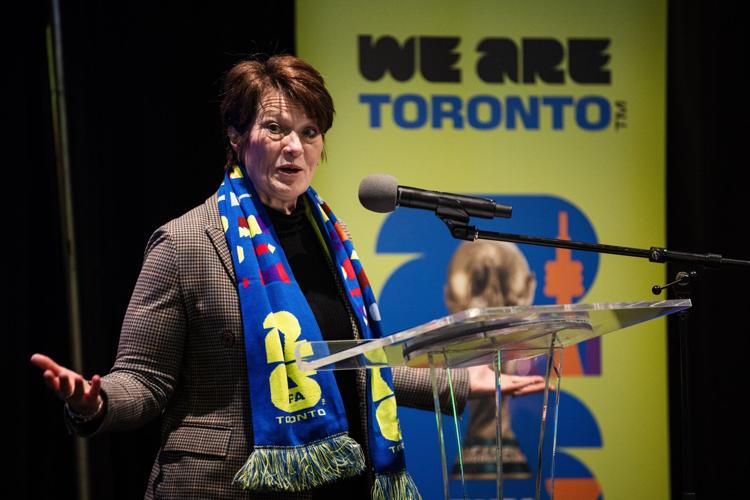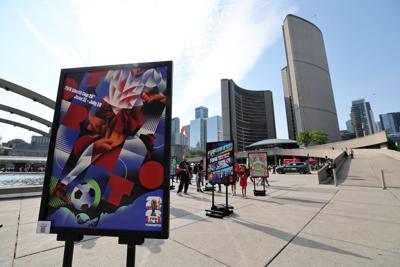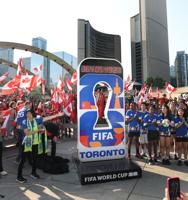To host six matches of the┬Ā2026 FIFA World Cup, ╬┌č╗┤½├Į has had to get creative to come up with the funding needed to pull off an international sporting event of this size ŌĆö including some previously untested strategies and a first-ever local sponsorship deal.
But less than one year away from the opening kickoff of the largest version of the global soccer showcase, some key questions about money remain that could throw a wrench into the cityŌĆÖs budgeting plans.
The city has estimated that it will cost about $380 million in total to host the global soccer showcase, which kicks off on June 11, 2026. Of that total, the federal government has agreed to contribute $104 million and Queen’s Park has pledged $97 million ŌĆö leaving the city to come up with the lionŌĆÖs share at roughly $180 million.
Tapping into reserves
Unlike the province or Ottawa, the city cannot run a deficit and like all Ontario municipalities it is limited in the ways it can generate more revenue, apart from the politically risky tactic of raising property taxes.
So for a big chunk of what it needs for the World Cup, the city has drawn from its own accounts. Approximately $63 million┬Ā is coming from that are typically used for paying capital expenditures, servicing the city’s debt and supporting┬Ā╬┌č╗┤½├ĮŌĆÖs large-scale events. The goal was┬Āto avoid affecting core municipal services or requiring unplanned increases to property taxes, a city spokesperson said.
In addition, city council approved a hike to the Municipal Accommodation Tax (MAT), which it applies to hotels and short-term rentals. In this case, the MAT is going up by 2.5 per cent starting this month┬Āuntil next July.┬ĀCity officials estimate the increased MAT could generate another $56.6 million for the FIFA event.
Because of a funding dispute with the province, there are still lingering questions about ╬┌č╗┤½├Į’s ability to live up to expectations.
Because of a funding dispute with the province, there are still lingering questions about ╬┌č╗┤½├Į’s ability to live up to expectations.
The city is also banking on another roughly $20 million plus to come from commercial rights sales (about half of which the city still needs to make but appears to be on the path to do so) and vendor rental fees.
Sharon Bollenbach, the city’s executive director for its World Cup leadership team, said another $20 million was found┬Āin two ways: $16.7 million in extra revenue the city generated last year through the MAT was transferred to the FIFA funds, and another $3.7 million came from parking dividends.
As of April, ╬┌č╗┤½├Į was still , a funding gap the city is looking to close with unique revenue sources since┬Āit wonŌĆÖt be getting a cut of the income and sales tax revenue the games will generate.
“I have to feel confident” the current shortfall will be bridged, said Bollenbach. “WeŌĆÖve got good people at the table and some good discussions. We’re very clear on what the requirements are for us to deliver.”
A new sponsorship deal
The city has been thrown a lifeline of sorts by FIFA itself. In a first for the tournament, a new agreement with soccerŌĆÖs international governing body allows the city to sign deals with local sponsors, rather than just FIFA’s global corporate partners, to help alleviate hosting costs.┬Ā
To that end, ╬┌č╗┤½├Į has set up a program dubbed the ”” where local sponsors can sign on to help it close most of the funding gap. The city this week announced Ontario Power Generation, a Crown corporation, as its first sponsor.
So far $3 million has been raised through donations to the Champions Table, with more to be announced over the next year. The city has a target of raising $15 million through sponsorships and donations, which will not only fund the World Cup games, but also improve local sports infrastructure and increase access to community youth programs.
Unique revenue strategies
Another fundraising strategy that’s a first┬Āfor ╬┌č╗┤½├Į for next yearŌĆÖs World Cup is the city getting 40 per cent of sales from merchandise sold that bears ╬┌č╗┤½├Į’s host city logo, though there is no revenue target for this, Bollenbach said.
“This arrangement is considered unique,”┬Āshe added. For other major events like the Pan Am Games and NBA All-Star Weekend merchandise sales were managed by external organizing bodies and the city didn’t get a cut.
Though Bollenbach was tight-lipped on details, the city could even make some money off music royalties. “There is potential ŌĆ” that we would receive royalties from streaming of (the tournament) song,” she said. As of Friday, there were no details confirmed on what these royalties from ╬┌č╗┤½├Į’s┬Ā produced by┬ĀCanadian songwriter┬ĀHill Kourkoutis might look like.
Typically, sports corporations will enlist an artist to create music for an event, and every time it’s played, the song generates a certain dollar amount, but the sports corporation typically gets the lion’s share of the money with major sporting events, said┬ĀVijay Setlur, a sports marketing instructor at York University’s Schulich School of Business.
“Music and sports are intertwined,” added Setlur, who was part of ╬┌č╗┤½├Į’s site organizing committee for the 2007 FIFA U-20 World Cup. “Music enhances the product and also brings in a new audience. Leveraging music to market sports makes it more relevant to more people.”
And in a more controversial move, the city also plans to spend $10.7 million to purchase suites, lounges and tickets as packages ŌĆö and then resell them at a higher price. Some councillors objected to this strategy as a form of ticket scalping, a characterization Bollenbach refutes: “It’s an opportunity for us as a host city to sell hospitality assets,” she said.
Along with other commercial sales at the stadium, Bollenbach said their revenue target to resell hospitality assets is $23 million, of which the city has already made half.
“It seems weird, but if you can make money doing it, you should,” said Victor Matheson, a sports economist based in Worcester, Mass.
But he cautioned that any time a municipality tries something new, there’s always a risk it may not live up to expectations.
Without knowing how the U.S. trade war might affect spectator turnout or even which teams will play in the ╬┌č╗┤½├Į matchups, “it’s very easy to get ahead of yourself about how much tourism is actually generated by these games,ŌĆØ said Matheson.
The provincial problem
The other snag in the cityŌĆÖs budget plans for the World Cup has been delivered by Premier Doug FordŌĆÖs government, which said last month that of its $97 million contribution, it says are required by the games, such as policing, provincial transit and health-care costs.
It’s unclear how much the city was budgeting to get in cash from the province, but city officials have said that getting only $58 million to spend how it wants is lower than they were expecting. That means ╬┌č╗┤½├Į is either on the hook for extra costs, which would increase its funding gap, or it will have to cut spending┬Āelsewhere.
Mayor Olivia Chow is adamant ╬┌č╗┤½├Į will not pay more than what it has already pledged to fund the games, and council passed a motion last month to trim $40 million from its World Cup budget, if the province maintains its list of service costs.
At an unrelated press conference Thursday, Chow wouldn’t disclose details of negotiations with the province over its contribution. “The conversation is ongoing,” she said. “It’s a question of how much (the province) claws back.”








































To join the conversation set a first and last name in your user profile.
Sign in or register for free to join the Conversation